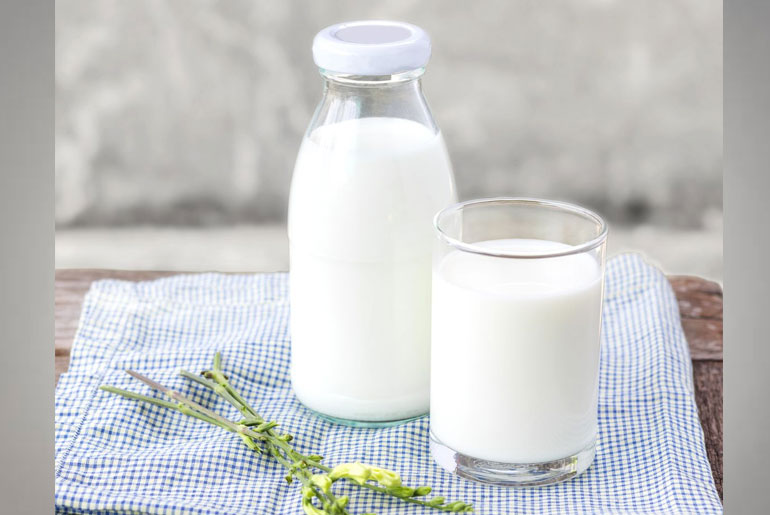Milk has long been valued for its high calcium and vitamin content, essential for human nutrition. To further enhance its nutritional benefits and flavor, several basic components can be added. Turmeric, known for its anti-inflammatory properties, can be mixed into milk to create golden milk, supporting immune health. Honey adds sweetness along with potential antibacterial benefits. Almonds, when crushed or blended into milk, increase protein and healthy fats.
Cinnamon not only enhances flavor but also provides antioxidants and aids in regulating blood sugar. Cardamom contributes digestive benefits and a unique taste, while saffron adds color and potential mood-enhancing properties. Incorporating these components enriches milk with additional vitamins, minerals, antioxidants, and health-promoting compounds, offering a holistic approach to enhancing both taste and nutritional value.
1. Turmeric Milk (Golden Milk) Benefits:
Turmeric milk, also known as golden milk, has become popular for its potential health benefits, primarily attributed to its key ingredient, turmeric. Here’s a look at why turmeric milk is praised for its health benefits:
- Anti-Inflammatory Properties: Turmeric contains curcumin, a compound known for its powerful anti-inflammatory properties. Studies, including research published in the Journal of Medicinal Food, have demonstrated that curcumin can help reduce inflammation and alleviate pain, particularly beneficial for conditions like arthritis.
- Antioxidant Benefits: Curcumin in turmeric also acts as an antioxidant, helping to neutralize free radicals and protect cells from damage. Antioxidants play a crucial role in overall health by supporting immune function and combating oxidative stress.
- Boosting Immunity: Turmeric milk is often consumed as a remedy to boost immunity. The combination of turmeric’s anti-inflammatory and antioxidant properties may contribute to supporting a healthy immune system.
How to Prepare Turmeric Milk
Preparing turmeric milk is simple and can be easily incorporated into your daily routine:
Ingredients:
- 1 cup of milk (dairy or plant-based)
- 1/2 teaspoon of turmeric powder (preferably organic)
Instructions:
- Warm a cup of milk in a saucepan over low to medium heat.
- Add half a teaspoon of turmeric powder to the warm milk.
- Stir well until the turmeric is fully dissolved into the milk.
- Optionally, you can sweeten with honey or maple syrup to taste, and add a pinch of black pepper to enhance absorption of curcumin.
- Drink the turmeric milk warm and enjoy its soothing benefits.
Additional Tips
- Variations: You can customize your turmeric milk by adding other spices like cinnamon, ginger, or cardamom for added flavor and health benefits.
- Timing: It’s generally recommended to consume turmeric milk before bedtime to promote relaxation and better sleep, although it can be enjoyed at any time of the day.
- Consistency: For consistent benefits, consider incorporating turmeric milk into your regular routine, taking advantage of its potential to support overall health and well-being.
Incorporating turmeric milk into your diet is a simple yet effective way to harness the health benefits of turmeric and curcumin, supporting inflammation reduction, antioxidant defense, and overall immunity enhancement.
2. Ginger Milk Benefits:
Ginger milk is a soothing and beneficial drink that combines the nutritional benefits of milk with the therapeutic properties of ginger. Here’s why ginger milk is praised for its health benefits:
- Digestive Aid: Ginger is well-known for its ability to aid digestion. It stimulates digestive enzymes and promotes the movement of food through the gastrointestinal tract, helping to alleviate symptoms of indigestion such as bloating and discomfort.
- Anti-Nausea Properties: Ginger is effective in reducing nausea, including morning sickness during pregnancy and nausea caused by motion sickness or chemotherapy. Studies, such as those published in Phytotherapy Research, have shown ginger’s ability to significantly reduce nausea and vomiting.
- Anti-Inflammatory and Antioxidant Effects: Ginger contains bioactive compounds that possess strong anti-inflammatory and antioxidant effects. These properties help combat oxidative stress, reduce inflammation in the body, and support overall immune health.
How to Prepare Ginger Milk
Making ginger milk is straightforward and can be enjoyed as a comforting drink, especially during cold and flu season:
Ingredients:
- 1 cup of milk (dairy or plant-based)
- 1 teaspoon of grated ginger or ginger powder
Instructions:
- Warm a cup of milk in a saucepan over low to medium heat.
- Add a teaspoon of grated ginger or ginger powder to the warm milk.
- Stir well to mix the ginger into the milk.
- Allow the ginger to steep in the milk for a few minutes to infuse its flavors and beneficial compounds.
- Optionally, you can sweeten with honey or maple syrup to taste.
- Strain the ginger milk if desired, then drink it warm and enjoy its soothing effects.
Additional Tips
- Variations: You can customize your ginger milk by adding other spices like cinnamon or cardamom for added flavor and health benefits.
- Health Benefits: Incorporating ginger milk into your diet can provide digestive support, reduce nausea, and boost immunity during cold and flu season.
- Timing: Enjoy ginger milk as a warming beverage in the morning or evening, or whenever you feel the need for its soothing effects on digestion and overall well-being.
By incorporating ginger milk into your routine, you can harness the digestive benefits of ginger along with the nutritional benefits of milk, promoting overall health and providing comfort during times of digestive discomfort or seasonal illnesses.
3. Honey Milk Benefits:
Honey milk is a comforting and nutritious beverage that combines the health benefits of milk with the natural sweetness and therapeutic properties of honey. Here’s why honey milk is considered beneficial:
- Natural Sweetener: Honey serves as a natural sweetener, providing a delicious flavor to milk without the need for refined sugars. It adds sweetness while also offering nutritional benefits.
- Antibacterial Properties: Honey possesses antibacterial properties that can help soothe a sore throat and support respiratory health. Research published in the Asian Pacific Journal of Tropical Biomedicine indicates that honey can act as a natural cough suppressant and throat soother.
- Antioxidant Benefits: Honey contains antioxidants that help combat oxidative stress and support overall immune function. These antioxidants contribute to maintaining good health and reducing the risk of chronic diseases.
How to Prepare Honey Milk
Making honey milk is simple and can be enjoyed as a soothing drink, especially before bedtime to promote relaxation and restful sleep:
Ingredients:
- 1 cup of milk (dairy or plant-based)
- 1 to 2 teaspoons of honey (adjust to taste)
Instructions:
- Warm a cup of milk in a saucepan over low to medium heat until it reaches your desired temperature.
- Stir in 1 to 2 teaspoons of honey, depending on your preference for sweetness. Adjust the amount of honey based on taste and sweetness desired.
- Stir well until the honey is fully dissolved into the warm milk.
- Optionally, you can add a pinch of cinnamon or nutmeg for added flavor.
- Drink the honey milk warm and enjoy its soothing taste and potential health benefits.
Additional Tips
- Variations: Experiment with different types of honey for varied flavors and potential additional health benefits. Manuka honey, for example, is known for its potent antibacterial properties.
- Health Benefits: Enjoying honey milk before bedtime can help promote relaxation and restful sleep, thanks to the soothing properties of honey and the comfort of warm milk.
- Nutritional Benefits: Honey milk provides a blend of nutrients from milk and the natural sweetness and health-promoting properties of honey, making it a wholesome beverage choice.
Incorporate honey milk into your evening routine as a delicious and comforting way to unwind and potentially support throat health and immune function, while enjoying its delightful taste and soothing effects.
4. Cinnamon Milk Benefits:
Cinnamon milk combines the nutritional benefits of milk with the potent health properties of cinnamon, offering a flavorful and beneficial beverage. Here’s why cinnamon milk is considered beneficial:
- Blood Sugar Regulation: Cinnamon is known for its ability to lower blood sugar levels and improve insulin sensitivity. Research, such as studies highlighted in the Journal of Diabetes Science and Technology, indicates that cinnamon may help regulate glucose metabolism, making it beneficial for individuals managing diabetes or seeking to stabilize blood sugar levels.
- Antioxidant Properties: Cinnamon is rich in antioxidants, such as polyphenols, which help protect the body against oxidative stress and inflammation. These antioxidants contribute to overall health and may reduce the risk of chronic diseases.
- Anti-Inflammatory Benefits: Cinnamon possesses anti-inflammatory properties that can help reduce inflammation in the body, supporting immune health and overall well-being.
How to Prepare Cinnamon Milk
Making cinnamon milk is simple and can be enjoyed as a warm and comforting beverage, especially beneficial for those looking to support blood sugar management:
Ingredients:
- 1 cup of milk (dairy or plant-based)
- Pinch of ground cinnamon or 1 small cinnamon stick
Instructions:
- Warm a cup of milk in a saucepan over low to medium heat until it is warm but not boiling.
- Add a pinch of ground cinnamon or place a small cinnamon stick into the warm milk.
Stir well to combine the cinnamon with the milk.
- Allow the cinnamon to steep in the milk for a few minutes to infuse its flavors and beneficial compounds.
- Optionally, sweeten with honey or maple syrup to taste, although cinnamon itself adds a subtle sweetness.
- Remove the cinnamon stick if used, then pour the cinnamon milk into a cup and enjoy its warm, soothing taste and potential health benefits.
Additional Tips
- Variations: Experiment with different types of cinnamon, such as Ceylon cinnamon or Cassia cinnamon, each offering unique flavors and potential health benefits.
- Health Benefits: Incorporating cinnamon milk into your diet can help support blood sugar regulation, provide antioxidant protection, and contribute to overall health and well-being.
- Timing: Enjoy cinnamon milk as a comforting beverage in the morning or evening, or as a soothing drink before bedtime to promote relaxation.
By adding cinnamon to warm milk, you can create a flavorful and health-promoting beverage that supports blood sugar management and provides antioxidant benefits, making it a delightful addition to your daily routine.
5. Saffron Milk Benefits:
Saffron milk is a luxurious and health-promoting beverage that combines the richness of milk with the therapeutic properties of saffron, known for its mood-enhancing and medicinal benefits. Here’s why saffron milk is considered beneficial:
- Mood Enhancement: Saffron is renowned for its ability to improve mood and alleviate symptoms of depression and anxiety. Research published in The Journal of Ethnopharmacology suggests that saffron has antidepressant effects comparable to certain conventional medications, making it a natural remedy for enhancing mental well-being.
- Antioxidant Properties: Saffron contains powerful antioxidants, such as crocin and crocetin, which help protect cells from oxidative stress and inflammation. These antioxidants contribute to overall health and may reduce the risk of chronic diseases.
- Anti-Inflammatory Benefits: Saffron possesses anti-inflammatory properties that can help reduce inflammation in the body, supporting immune health and potentially alleviating symptoms of conditions related to inflammation.
How to Prepare Saffron Milk
Making saffron milk is straightforward and allows you to enjoy its exquisite taste and potential health benefits:
Ingredients:
- 1 cup of milk (dairy or plant-based)
- A few strands of saffron
Instructions:
- Warm a cup of milk in a saucepan over low to medium heat until it is warm but not boiling.
- Add a few strands of saffron to the warm milk.
- Let the saffron steep in the milk for a few minutes to infuse its color, flavor, and beneficial compounds.
- Stir the saffron milk gently to distribute the saffron strands.
- Optionally, sweeten with honey or a natural sweetener if desired, although saffron itself adds a subtle sweetness.
- Pour the saffron milk into a cup and savor its rich flavor and potential mood-enhancing benefits.
Additional Tips
- Quality of Saffron: Use high-quality saffron for the best flavor and medicinal benefits. Saffron should impart a rich golden color and a distinct aroma to the milk.
- Health Benefits: Incorporate saffron milk into your routine to enjoy its mood-enhancing effects, antioxidant protection, and potential anti-inflammatory benefits.
- Enjoyment: Saffron milk can be enjoyed warm, making it an ideal soothing beverage in the evening or before bedtime to promote relaxation and mood improvement.
By preparing saffron milk, you can indulge in a beverage that not only delights the senses with its unique flavor but also offers potential health benefits, particularly in enhancing mood and reducing anxiety.
6. Almond Milk Benefits:
Almond milk is a nutritious and dairy-free alternative to traditional milk, offering a host of health benefits due to its nutrient-rich composition. Here’s why almond milk is considered beneficial:
- Nutrient Density: Almonds are packed with healthy fats, fiber, protein, and essential vitamins and minerals, making almond milk a nutrient-dense beverage. It contains vitamin E, which supports skin health and acts as an antioxidant.
- Heart Health: Research, such as studies published in the Journal of Nutrition, suggests that almond consumption can help lower cholesterol levels and improve heart health. The monounsaturated fats in almonds are heart-healthy and can contribute to reducing the risk of cardiovascular diseases.
- Lactose-Free and Vegan: Almond milk is naturally lactose-free and suitable for those following a vegan or dairy-free diet. It provides a creamy texture and nutty flavor without the need for animal products.
How to Make Almond Milk
Making almond milk at home is simple and allows you to enjoy its nutritional benefits:
Ingredients:
- 1 cup of almonds, soaked overnight or for at least 4 hours
- 4 cups of water
- Optional: Sweeteners like honey or dates, and flavors like vanilla extract
Instructions:
- Drain and rinse the soaked almonds.
- In a blender, combine the soaked almonds with 4 cups of water.
- Blend on high speed for 1-2 minutes until the almonds are finely ground and the mixture looks creamy.
- Optionally, strain the almond mixture through a nut milk bag, cheesecloth, or fine mesh sieve to remove the almond pulp. This step is optional; some prefer to enjoy almond milk with the pulp for added fiber.
- If desired, sweeten the almond milk with honey, dates, or add vanilla extract for flavor.
Store the almond milk in a sealed container in the refrigerator for up to 4-5 days. Shake well before serving, as it may naturally separate.
Additional Tips
- Versatility: Use almond milk as a dairy alternative in coffee, tea, smoothies, cereal, or recipes that call for milk.
- Nutritional Boost: Almond milk provides a good balance of nutrients, including vitamin E, calcium (if fortified), and healthy fats, supporting overall health and well-being.
- Homemade Advantage: Making almond milk at home allows you to control ingredients and customize flavors and sweetness levels to suit your preferences.
By incorporating almond milk into your diet, you can benefit from its nutrient-rich profile, support heart health, and enjoy a delicious dairy-free beverage that complements various recipes and lifestyles.
Disclaimer:
The information contained in this article is for educational and informational purposes only and is not intended as a health advice. We would ask you to consult a qualified professional or medical expert to gain additional knowledge before you choose to consume any product or perform any exercise.








